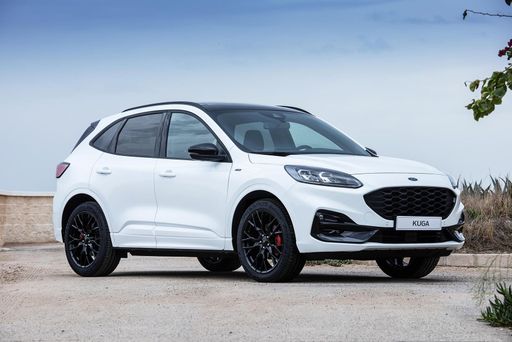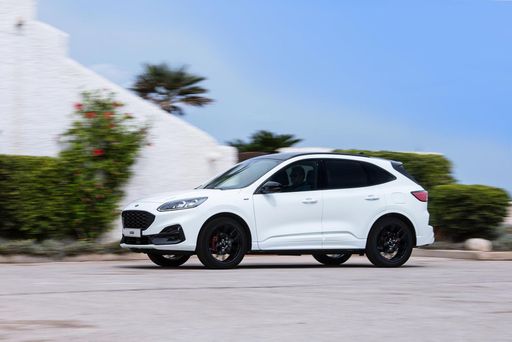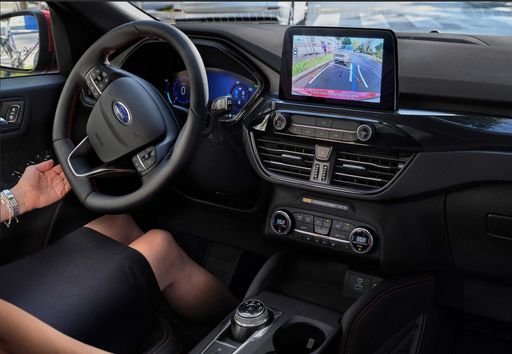Ford Kuga VS Hyundai Tucson
In the competitive SUV market, the Ford Kuga stands out with its dynamic handling and sporty design, appealing to drivers who crave an engaging driving experience. In contrast, the Hyundai Tucson offers a more refined ride, with a spacious interior and a wealth of tech features that cater to family needs. Both models present compelling choices, but ultimately depend on whether you prioritize performance or comfort.
Ford Kuga
The Ford Kuga stands out in the realm of compact SUVs with its sleek design and dynamic performance capabilities. Its spacious interior is thoughtfully designed to provide comfort and practicality for both driver and passengers, making it an ideal choice for families and adventurers alike. Advanced technology and safety features further enhance the driving experience, ensuring a seamless blend of innovation and reliability on the road.
detailsHyundai Tucson
The Hyundai Tucson is a standout choice in the compact SUV segment, offering a perfect blend of style, comfort, and practicality. Its modern design is complemented by a spacious interior that provides ample room for passengers and luggage alike. With advanced technology and safety features, the Tucson ensures a smooth and enjoyable driving experience.
detailsThe mid-size SUV segment has become increasingly competitive, with the Ford Kuga and Hyundai Tucson standing out as two notable contenders. As drivers seek performance, comfort, and technology, these models offer a wealth of options that warrant a closer comparison. Let’s dive into the finer points of these two SUVs and see how they stack up against each other.
Pricing and Models
The Ford Kuga boasts a price range starting from €39,950 to €52,200 across various configurations. It offers a selection of powertrains, including petrol, full hybrid, and plug-in hybrid options, making it versatile for different driving preferences.
In contrast, the Hyundai Tucson presents a slightly more diverse pricing spectrum, from €34,990 to €54,050. Comparable to the Kuga, the Tucson also provides a variety of engines, including diesel MHEV, petrol MHEV, full hybrid, and plug-in hybrid models. Both cars offer solid value, but the Tucson holds the edge with a lower entry price.
Dimensions and Design
The Ford Kuga measures between 4,604 mm and 4,645 mm in length, with a width of 1,882 mm and a height ranging from 1,675 mm to 1,681 mm. In terms of trunk capacity, it offers a respectable 412 liters, catering well to families or adventurers needing extra storage.
On the other hand, the Hyundai Tucson is marginally longer at 4,510 mm to 4,520 mm, with a width of 1,865 mm and a height of 1,650 mm. The Tucson’s trunk capacity is remarkable, providing between 546 and 620 liters, making it ideal for hauling larger items effortlessly.
Powertrains and Performance
The Kuga is powered by a range of engines, including a robust 243 HP variant and a hybrid option with a fuel consumption as low as 0.9 L/100 km. This makes it particularly appealing for those conscious of fuel efficiency. Additionally, it can accelerate from 0-100 km/h in as little as 7.3 seconds.
Conversely, the Tucson also offers impressive power with options that boast up to 252 HP. Its best-performing variant accelerates from 0-100 km/h in just 7.9 seconds, with a fuel consumption that can dip to an impressive 1.0 L/100 km for its hybrid configurations. The Kuga wins in terms of pure hybrid range with an electric-only range of 69 km, while the Tucson slightly lags with 65 km to 70 km.
Driving Experience
In terms of driving dynamics, both vehicles offer all-wheel drive options, but the Kuga's CTV and manual gearbox options provide a nuanced approach for driving enthusiasts. The Kuga’s top speed can reach 200 km/h, whereas the Tucson caps at 194 km/h, indicating a slight performance edge for the Ford.
However, the Tucson’s diesel and MHEV options grant it a preferable torque rating of up to 367 Nm, delivering a more vigorous pull than the Kuga’s 240 Nm. This makes the Tucson a more compelling option for those who prioritize towing or off-road capabilities.
Safety and Technology Innovations
Both SUVs are equipped with cutting-edge safety and technology features. The Ford Kuga includes advanced driver-assistance systems like adaptive cruise control and blind-spot monitoring, ensuring a safe journey.
The Hyundai Tucson matches these offerings with its suite of safety technologies, including smart cruise control, lane-keeping assist, and an impressive set of collision avoidance systems. In terms of infotainment, both models offer modern touchscreen interfaces compatible with Apple CarPlay and Android Auto, creating a seamless connection to your smartphone.
Conclusion
In the battle of the Ford Kuga versus the Hyundai Tucson, both vehicles bring unique strengths to the table. The Kuga excels with its hybrid technology and performance, while the Tucson showcases versatility with its engine options and spacious interior.
Ultimately, the choice will depend on individual preferences for performance, comfort, and design. Whichever model you choose, both the Kuga and Tucson promise to deliver a compelling driving experience in the competitive SUV market.
 @ kuga.fordpresskits.com
@ kuga.fordpresskits.com
 @ kuga.fordpresskits.com
@ kuga.fordpresskits.com
 @ kuga.fordpresskits.com
@ kuga.fordpresskits.com
 @ hyundai.news
@ hyundai.news
 @ hyundai.news
@ hyundai.news
 @ hyundai.news
@ hyundai.news
 @ hyundai.news
@ hyundai.news
 @ hyundai.news
@ hyundai.news

|

|
|
|
|
Costs and Consumption |
|
|---|---|
|
Price
about 36900 - 48600
$
|
Price
about 32300 - 50000
$
|
|
Consumption L/100km
0.9 - 6.4
L
|
Consumption L/100km
1 - 6.8
L
|
|
Consumption kWh/100km
-
|
Consumption kWh/100km
-
|
|
Electric Range
69
km
|
Electric Range
65 - 70
km
|
|
Battery Capacity
1.1 - 14.4
kWh
|
Battery Capacity
-
|
|
co2
20 - 145
g/km
|
co2
22 - 153
g/km
|
|
Fuel tank capacity
42 - 54
L
|
Fuel tank capacity
42 - 54
L
|
Dimensions and Body |
|
|
Body Type
SUV
|
Body Type
SUV
|
|
Seats
5
|
Seats
5
|
|
Doors
5
|
Doors
5
|
|
Curb weight
1526 - 1859
kg
|
Curb weight
1520 - 1889
kg
|
|
Trunk capacity
412
L
|
Trunk capacity
546 - 620
L
|
|
Length
4604 - 4645
mm
|
Length
4510 - 4520
mm
|
|
Width
1882
mm
|
Width
1865
mm
|
|
Height
1673 - 1681
mm
|
Height
1650
mm
|
|
Payload
541 - 550
kg
|
Payload
525 - 545
kg
|
Engine and Performance |
|
|
Engine Type
Petrol, Full Hybrid, Plugin Hybrid
|
Engine Type
Diesel MHEV, Petrol MHEV, Petrol, Full Hybrid, Plugin Hybrid
|
|
Transmission
Manuel, Automatic
|
Transmission
Automatic, Manuel
|
|
Transmission Detail
Manual Gearbox, CVT
|
Transmission Detail
Automat. Schaltgetriebe (Doppelkupplung), Manual Gearbox, Automatic Gearbox
|
|
Drive Type
Front-Wheel Drive, All-Wheel Drive
|
Drive Type
Front-Wheel Drive, All-Wheel Drive
|
|
Power HP
150 - 243
HP
|
Power HP
136 - 252
HP
|
|
Acceleration 0-100km/h
7.3 - 9.5
s
|
Acceleration 0-100km/h
7.9 - 11.6
s
|
|
Max Speed
195 - 200
km/h
|
Max Speed
180 - 194
km/h
|
|
Torque
240
Nm
|
Torque
265 - 367
Nm
|
|
Number of Cylinders
3 - 4
|
Number of Cylinders
4
|
|
Power kW
110 - 178
kW
|
Power kW
100 - 185
kW
|
|
Engine capacity
1497 - 2488
cm3
|
Engine capacity
1598
cm3
|
|
Top speed
195 - 200
km/h
|
Top speed
180 - 194
km/h
|
General |
|
|
Model Year
2024
|
Model Year
2024
|
|
CO2 Efficiency Class
E, D, B
|
CO2 Efficiency Class
D, E, B
|
|
Brand
Ford
|
Brand
Hyundai
|
Ford Kuga
Discovering the Ford Kuga: An SUV for the Modern Age
The Ford Kuga has established itself as a versatile and reliable choice in the competitive SUV market. Combining sleek design with innovative technology, the Kuga offers a range of options to suit different driving preferences and needs. Let’s delve into the various technical details and pioneering features that make this vehicle stand out.
Design and Construction
The Ford Kuga embodies a contemporary design ethos, with dimensions that accommodate both functionality and style. Measuring between 4604 and 4645 mm in length, the Kuga is designed to offer ample interior space while maintaining a compact exterior profile. This is complemented by a width of 1882 to 1883 mm and a height ranging from 1650 to 1681 mm, ensuring a comfortable and commanding drive on the road.
Innovative Powertrains
With a diverse array of engine configurations, the Kuga caters to both traditional and eco-conscious drivers. The range includes 1.5-litre EcoBoost petrol engines, 2.0-litre EcoBlue diesel options, as well as an innovative 2.5-litre full hybrid and plug-in hybrid variants. The hybrid models, particularly the plug-in hybrid, offer impressive efficiency with a consumption as low as 0.9 L/100 km and an electric range of up to 69 km.
Performance and Efficiency
The Kuga delivers a robust performance with power outputs ranging from 120 PS to 243 PS, ensuring there is a model to match your driving style. The vehicle accelerates from 0-100 km/h in as little as 7.3 seconds, depending on the chosen powertrain. Notably, the plug-in hybrid versions allow for considerable fuel savings, making the Kuga a cost-effective option for long-term use.
Advanced Technology and Features
Ford has integrated the latest technology into the Kuga, enhancing both comfort and safety. The vehicle features multiple driving modes tailored to different terrains, advanced driver-assistance systems, and a user-friendly infotainment system that keeps all controls within easy reach. The intelligent all-wheel-drive system available on certain models provides enhanced grip and stability in challenging conditions.
Interior Comfort and Practicality
Inside the Kuga, you'll find a spacious cabin with seating for five, designed with both comfort and utility in mind. The boot space ranges from 405 to 435 litres, allowing for an impressive amount of luggage capacity. High-quality materials and smart design choices throughout the cabin ensure a premium experience, further enhanced by options like Vignale trims for those seeking added luxury.
A Sustainable Choice
With its focus on efficiency and reduced emissions, the Ford Kuga aligns with the growing demand for environmentally responsible vehicles. The CO2 emissions range from 20 to 155 g/km, placing many models in favourable efficiency classes, thus contributing to a more sustainable future.
Conclusion
The Ford Kuga stands out in the SUV segment by offering a perfect blend of performance, technology, and sustainability. Its versatility makes it an ideal choice for diverse lifestyles, from urban adventures to rural explorations. With its innovative features and design, the Kuga is a testament to Ford’s commitment to delivering high-quality vehicles suited to today's discerning drivers.
Hyundai Tucson
Introducing the Hyundai Tucson: An SUV with Innovation at its Core
The Hyundai Tucson has long been synonymous with reliability, comfort, and exceptional value. With its 2024 model, this popular SUV has taken a bold leap forward by incorporating cutting-edge technology, efficient powertrains, and striking design. Let's delve into the technical details and innovations that make the Hyundai Tucson a standout in the crowded SUV market.
Dynamic Engine Options: Power Meets Efficiency
The Tucson offers a range of powertrains, ensuring there is a model perfect for every driver. Whether you're looking for the fuel efficiency of a mild-hybrid diesel or the power of a plug-in hybrid, the Tucson has you covered. The engine options include:
- Diesel Mild-Hybrid: Combining efficiency with robust performance.
- Benzin Mild-Hybrid: Offering a balance between economy and power.
- Voll-Hybrid: Delivering impressive power while maintaining low fuel consumption.
- Plug-in Hybrid: Offering electric-only driving capabilities with a range of up to 65 km.
These engines are paired with either a manual or automatic transmission, catering to different driving preferences.
Performance and Handling: Experience the Drive
The performance of the Hyundai Tucson is designed to impress, with power outputs ranging from 136 to 252 PS. The Tucson accelerates from 0-100 km/h in as little as 8.1 seconds, managed by precise transmission options such as the dual-clutch and traditional automatic gearboxes. With both front-wheel and all-wheel drive options, the Tucson assures stability and control in varied driving conditions.
Interior and Technology: Comfort Meets Cutting-Edge Innovation
The Tucson's interior is a haven of comfort and technology. With a length ranging up to 4520 mm and a spacious boot capacity of 620 litres, practicality is at the forefront. The intuitive infotainment system includes advanced connectivity features, while driver-assist technologies enhance safety and convenience on every journey.
The choice of luxurious trims and finishes, combined with ergonomic design, ensures that every drive is a pleasure, whether you're on a daily commute or an extended adventure.
Environmental Considerations: Efficiency and Sustainability
Hyundai has made notable strides in ensuring that the Tucson is as environmentally friendly as possible. Models with CO2 emissions as low as 27 g/km place it amongst the leaders in its class for eco-friendly driving. The array of hybrid options further complements Hyundai's commitment to sustainability, providing consumers with green alternatives without compromising performance.
Conclusion: The Hyundai Tucson Is More Than Just an SUV
The 2024 Hyundai Tucson is more than just a means of transport—it's a statement of modernity. It reflects Hyundai's dedication to innovation, efficiency, and comfort, all wrapped up in a stylish and versatile SUV. Whether you're tech-savvy, eco-conscious, or performance-oriented, the Tucson proves to be an ideal choice for forward-thinking drivers.
